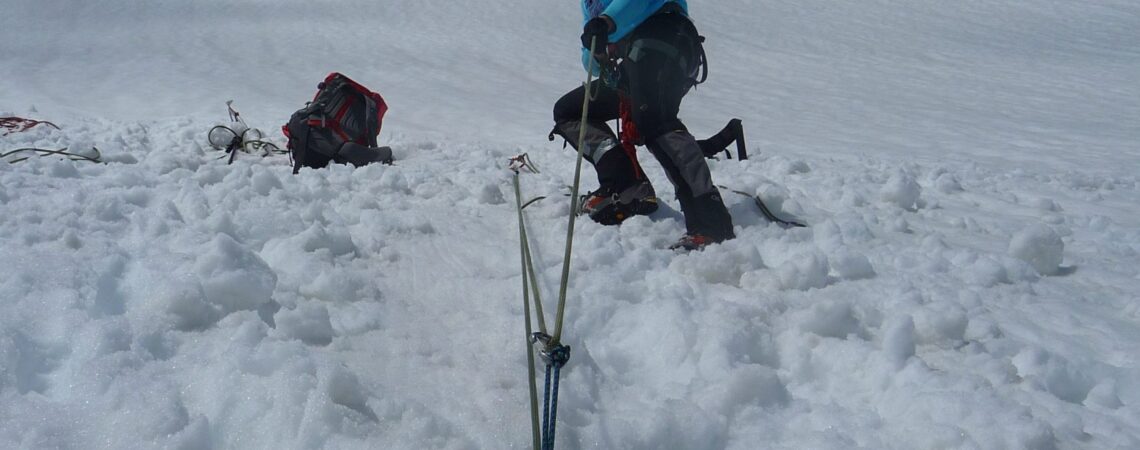- Dates: March 1, 14, 28; April 4, 12, 26; May 4
- Duration: 1
- Level: Beginner
- Client Ratio: 4:1
- Cost: $275
- Included: Instruction, group climbing equipment, crevasse rescue cards
- Not Included: Transportation, personal climbing equipment, meals
Join us for our One-Day Crevasse Rescue Course, designed to give climbers and skiers the essential skills the need to travel safely on glaciers. This intensive seminar focuses on practical techniques for rigging the rope for glacier travel as well as hauling systems, self-rescue, and partner rescue, with plenty of hands-on practice in realistic scenarios. Whether you’re preparing for a glacier climb in the Cascades, an expedition to Alaska, or ski mountaineering in the Alps, this course provides the confidence and competence you need to manage crevasse hazards effectively.
Our experienced guides emphasize a hands-on, experiential learning approach where you’ll spend most of the day practicing skills in the field. We keep the group size small to maximize individual coaching and ensure you leave with both the technical know-how and decision-making framework to apply these systems in real-world situations. This course is ideal for climbers new to glacier travel as well as those looking for a refresher before a bigger trip.
This is an intensively focused, one-day course, so students should arrive prepared with a solid foundation in basic knots and hitches. Before the course, please be comfortable tying a re-woven figure-8, figure-8 on a bight, overhand on a bight, clove hitch, prusik hitch, and a munter hitch. Having these skills in place ensures we can spend the day applying them to rescue systems and practicing real-world scenarios, making the most of our limited time together. Students taking this course should also already be familiar with ice axe, self-arrest, and cramponing techniques.
-
-
- Harness
- Climbing Helmet
- 2 Large Locking Carabiners
- 2 Small Locking Carabiner
- 5 Non-Locking Carabiners
- 1 pre-sewn third hand like a Hollow Block or 12″ 5-6 mm cord/prusik loop
- 1-2 120cm Slings
- 1 Petzl Tibloc or small prusik loop
- 1 Microtraxion & 1 Tibloc
- Crampons
- Ice Axe
-
Upper Body
-
-
- Lightweight base layer T-shirt or long sleeve polypropylene shirt
- Soft Shell
- 1 Down/synthetic jacket with hood
- 1 Hard shell jacket with hood Waterproof and breathable. roomy enough to fit over multiple layers.
- 1 pair light gloves
- Shell gloves or mitts
- Warm hat Wool or synthetic
- Balaclava or Buff
- Shade hat or baseball cap
-
Lower Body
-
-
- 1 pair heavy wool/synthetic socks Check boot fit with liner and wool socks on
- 1 pair lightweight long underwear
- Soft shell pants
- Shell pants Waterproof/breathable with full side zips, Gore-Tex or equivalent is best
-
Backpack
-
-
- Internal frame pack 2000-2500 cubic inch capacity, avoid unnecessary options that add weight
-
Miscellaneous Equipment
-
-
- GSunglasses 100% UV protection
- Personal first aid kit Basics: moleskin/blister kit, Band-Aids, first-aid tape, ibuprofen, personal medications, etc.
- Lip balm At least SPF 20,
- Sunscreen At least SPF 40
- Headlamp compact LED
- 2 water bottles 1 liter wide-mouth Nalgene and 1 bottle holster, or
- Multi-tool.
- Bandana
- 1 small stainless steel thermos (Optional)
- Lunch
-
Field Day 1
@Snoqualmie Pass, arrive 7:00 am, ready to go at 7:30am, perform a gear check and tour to our first site to work on the following:
-
-
- Snow Anchors
- Mechanical Advantage Systems
- Rescue Systems
-
WHO WILL MY GUIDE (OR GUIDES) BE?We are small company who enjoy working together in the mountains as well as highly skilled professionals who hold current Wilderness First Responder certification and are proficient in technical rescue and evacuation skills. Our guides are dedicated to the world of alpinism, many having first ascents and hold professional certifications with the AMGA in the rock, alpine, and ski disciplines. The AMGA is part of the IFMGA, which is the international body of certified mountain guides.
HOW MUCH SHOULD I TIP MY GUIDES?Tipping is considered standard practice in the guiding industry. Tipping amounts vary – so $20-30 per day per person/per guide is average that works well for the guides without a serious blow to your wallet. Often 10% of the course cost is a good rule-of-thumb. If you feel that the program was exceptional or substandard the tip can reflect that.
CAN I RENT EQUIPMENT FROM BCAG?No, for these trips we strongly suggest to buy your equipment due to obscenely large rental costs for trip of this length.
HOW HEAVY WILL MY PACK BE?Day trips will keep your pack between 10-15 pounds max.
WHEN DO I NEED TO PAY THE BALANCE OF MY TRIP?For Scheduled Domestic Courses and Climbs: Your balance is due 60 days from trip departure. Payable by check, Credit Card with service charge or Venmo.
WHAT HAPPENS IF I NEED TO CANCEL MY TRIP? If you should decide to cancel your trip, BCAG must be notified in writing. Your trip will be cancelled from the date we receive written notice. You will be assessed a cancellation fee according to the following schedule:90 to 31 days from trip departure – 50% of trip cost30 days or less – 100% of trip cost
WHAT HAPPENS IF BC ADVENTURE GUIDES HAS TO CANCEL MY TRIP? In the rare circumstance where we need to cancel a program you can reschedule without a fee or receive a refund on your deposit. If circumstances arise that force us to cancel a program that is already in progress, we reserve the right to decide whether a refund or credit, at a prorated rate, will be issued. We are not responsible for cancellation fees or costs arising from your changed or cancelled flights, lodging, or other arrangements. We strongly recommend obtaining trip cancellation insurance from your travel agent.


